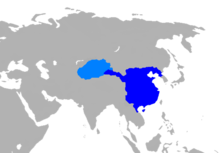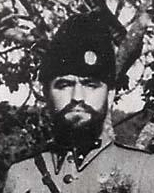Portal:History
The History Portal

Historia by Nikolaos Gyzis
History (derived from Ancient Greek ἱστορία (historía) 'inquiry; knowledge acquired by investigation') is the systematic study and documentation of the human past.
The period of events before the invention of writing systems is considered prehistory. "History" is an umbrella term comprising past events as well as the memory, discovery, collection, organization, presentation, and interpretation of these events. Historians seek knowledge of the past using historical sources such as written documents, oral accounts, art and material artifacts, and ecological markers. History is incomplete and still has debatable mysteries.
History is an academic discipline which uses a narrative to describe, examine, question, and analyze past events, and investigate their patterns of cause and effect. Historians debate which narrative best explains an event, as well as the significance of different causes and effects. Historians debate the nature of history as an end in itself, and its usefulness in giving perspective on the problems of the present.
Stories common to a particular culture, but not supported by external sources (such as the tales surrounding King Arthur), are usually classified as cultural heritage or legends. History differs from myth in that it is supported by verifiable evidence. However, ancient cultural influences have helped create variant interpretations of the nature of history, which have evolved over the centuries and continue to change today. The modern study of history is wide-ranging, and includes the study of specific regions and certain topical or thematic elements of historical investigation. History is taught as a part of primary and secondary education, and the academic study of history is a major discipline in universities.
Herodotus, a 5th-century BC Greek historian, is often considered the "father of history", as one of the first historians in the Western tradition, though he has been criticized as the "father of lies". Along with his contemporary Thucydides, he helped form the foundations for the modern study of past events and societies. Their works continue to be read today, and the gap between the culture-focused Herodotus and the military-focused Thucydides remains a point of contention or approach in modern historical writing. In East Asia, a state chronicle, the Spring and Autumn Annals, was reputed to date from as early as 722 BC, though only 2nd-century BC texts have survived. (Full article...)
Featured picture
Did you know (auto generated)

- ... that What Hath God Wrought, the 2007 history of Jacksonian America written by Daniel Walker Howe, is dedicated to Andrew Jackson's "political nemesis" John Quincy Adams?
- ... that Italian Jacopo Tissi became one of the few foreign principal dancers in Bolshoi Ballet's history, only to leave two months later due to the Russian invasion of Ukraine?
- ... that the history of philosophy in India is characterized by its combined interest in the nature of reality, the ways of arriving at knowledge, and the spiritual question of how to reach enlightenment?
- ... that the first game in Georgetown football history was never played?
- ... that no one laughed at the worst joke in legal history?
- ... that Kobe and Vanessa Bryant were founding donors of the National Museum of African American History and Culture?
Calvin Coolidge (born John Calvin Coolidge Jr.; /ˈkuːlɪdʒ/; July 4, 1872 – January 5, 1933) was an American attorney and politician who served as the 30th president of the United States from 1923 to 1929.
Born in Vermont, Coolidge was a Republican lawyer who climbed the ladder of Massachusetts politics, becoming the state's 48th governor. His response to the Boston police strike of 1919 thrust him into the national spotlight as a man of decisive action. The next year, Coolidge was elected the country's 29th vice president and succeeded to the presidency upon President Warren G. Harding's sudden death in 1923. Elected in his own right in 1924, Coolidge gained a reputation as a small-government conservative with a taciturn personality and dry sense of humor that earned him the nickname "Silent Cal". His widespread popularity enabled him to run for a second full term, but Coolidge chose not to run again in 1928, remarking that ten years as president would be "longer than any other man has had it—too long!" (Full article...)On this day
- 1536 – Spanish conquest of the Inca Empire: Sapa Inca emperor Manco Inca Yupanqui's army began a ten-month siege of Cusco against a garrison of Spanish conquistadors and Indian auxiliaries led by Hernando Pizarro.
- 1782 – Construction began on the Grand Palace (pictured) in Bangkok, the official residence of the king of Thailand.
- 1915 – Imperial Trans-Antarctic Expedition: SY Aurora, anchored in McMurdo Sound, broke loose during a gale, beginning a 312-day ordeal in the Ross Sea and Southern Ocean for her 18-man crew.
- 2004 – The final episode of the television sitcom Friends was aired.
- 2013 – Amanda Berry escaped from the Cleveland, Ohio, home of her captor, Ariel Castro, having been held there with two other women for ten years.
- Henry David Thoreau (d. 1862)
- Martin Brodeur (b. 1972)
- Reg Grundy (d. 2016)
Selected quote
There cannot be two suns in the sky, nor two emperors on the earth.
— Confucius, Chinese Sage and Philosopher
Related portals
More Did you know...
- ... that the underground Fortress of Mimoyecques (pictured) was built by Nazi Germany to bombard London with 10 shells a minute using the V-3 supergun?
- ... that Howard P. Perry was the first African American recruit in the United States Marine Corps?
- ... that the Chester city walls form the most complete circuit of Roman and medieval defensive town walls in Britain?
- ... that China's first female director was adopted by the first Premier of the People's Republic of China?
- ... that the Medieval Merchant's House in Southampton was being used as a brothel when bomb damage during the Blitz revealed the building's important medieval architecture?
- ... that the Sumerian "river of paradise", the Hubur, derived partly from real geography before becoming a demonic fantasy?
- ... that Bill Foley's photograph "The Last Smile" shows Anwar Sadat only moments before his assassination?
- ... that the 1911 Sarez earthquake triggered a huge landslide, forming the tallest dam in the world?
Topics
Categories

History • By period • By region • By topic • By ethnic group • Historiography • Archaeology • Books • Maps • Images • Magazines • Organizations • Fictional • Museums • Pseudohistory • Stubs • Timelines • Chronology • People • Wikipedia historians
WikiProjects
![]() WikiProject History •
Ancient Near East • Australian History • Classical Greece and Rome • Dacia • Former countries • History of Canada • Chinese history • European history • Heraldry and vexillology • Indian history • Jewish history • Medieval Scotland • Mesoamerica • Military history • Middle Ages • History of Science
WikiProject History •
Ancient Near East • Australian History • Classical Greece and Rome • Dacia • Former countries • History of Canada • Chinese history • European history • Heraldry and vexillology • Indian history • Jewish history • Medieval Scotland • Mesoamerica • Military history • Middle Ages • History of Science
WikiProject Time • Days of the Year • Years
WikiProject Biography • Composers • Political figures • Saints • United States Presidents
Things you can do
 |
Here are some tasks awaiting attention:
|
Associated Wikimedia
The following Wikimedia Foundation sister projects provide more on this subject:
-
Commons
Free media repository -
Wikibooks
Free textbooks and manuals -
Wikidata
Free knowledge base -
Wikinews
Free-content news -
Wikiquote
Collection of quotations -
Wikisource
Free-content library -
Wikiversity
Free learning tools -
Wiktionary
Dictionary and thesaurus





















































